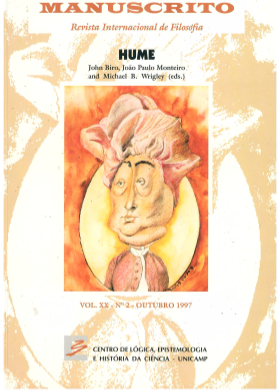Resumo
Hume's famous account of our idea of the identity through time of persons and objects is based upon a principle of individuation accord harges which the idea of numerical sameness properly applies only to unchanging objects. Hume derives this idea of identity from a fiction of the imagination concerning the possibility of time without change. I argue that the puzzle Hume raises concerning identity and change is an important one in the form that he raised it, and not misguided as some have suggested; however, I show that his recourse to the duration fiction in attempting to account for our ascriptions of identity lands him in a vicious circularity. In the course of these arguments I take a close look at the nature of Humean fictions. In the final section I then suggest that there are resources in the Treatise for a more successful Humean account of the idea or fiction' of identity, based primarily on certain aspects of Hume's theory of abstract ideas.
Referências
Bennett, J. (1966). Locke, Berkeley, Hume: Central Themes (Oxford, Clarendon Press).
Baxter, D. (1987). A Defense of Hume on Identity Through Time, Hume Studies, 323-42.
Costa. M. J. (1990) Hume, Stric Identity, and Time’s Vacuum, Hume Studies, 1-16.
Frege, G. (1960). Sense and Reference, in Philosophical Writings of Gottlob Frege, P. Geach and M. Black (eds.), 2nd edn. (Oxford, Blackwell).
Kripke, S. (1980). Naming and Necessity (Cambridge, Mass., Havard University Press).
Migrae, R. (1980). The Import of Hume’s Theory of Time, Hume Studies, 119-132.
O’shea, J.R. (1996) Hume’s Reflective Return to the Vulgar, Bristish Journal of the History of Philosophy, 285-315.
Penelhum, T. (1955). Hume on Personal Identity, Philosophical Review, 64, 571-89, reprinted in V.C. Chappell (ed.), Hume: A Collection of Critical Essays (Notre Dame, Ind., University of Notre Dame Press, 1968), 213-239.
Perry, J. (1975). Introdution, in J. Perry (ed), Personal Identity (Berkeley, University of California Press).
Price, H.H. (1940). Hume’s Theory of the External World (Oxford, Clarendon Press).
Quine, W.V (1953). ‘Identity, Ostension, and Hypostasis’, in From a Logical Point of View (Cambridge, Mass., Havard).
Quine, W.V (1960). Word and Object (Cambridge, Mass., M.I.T.).
Quine, W.V (1973). The Roots of Reference (La Salle, Open Court).
Quine, W.V (1982). Methods of Logic, 4th edn. (Cambridge, Mass., Harvard).
Russell, B. (1956). Logic and Knowledge: Essays 1901-1950. R.C. March, ed.(London, Allen and Unwin).
Stroud, B. (1977). Hume (London, Routledge).
Van Steenburgh, E.W. (1977). Durationless Moments in Hume’s Treatise, in David Hume: Bicentenary Papers, ed. G.P. Morice (Edinburgh University Press).
Wiggins, D. (1980). Sameness and Substance (Oxford, Blackwell).
Wittgenstein, L. (1922). Tractatus Logico-Philosophicus, C.K. Ogden (tr.) (London, Routledge).
Wittgenstein, L. (1953). Philosophical Investigations, G.E.M. Anscombe (tr.) (Oxford, Blackwell).

Este trabalho está licenciado sob uma licença Creative Commons Attribution 4.0 International License.
Copyright (c) 1997 Manuscrito: Revista Internacional de Filosofia

